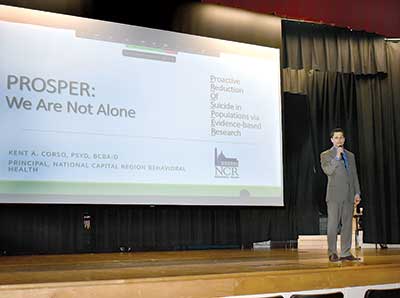
Talk at St. Clare Walker Middle School aims to help reverse upward trends in suicide, especially in those most at risk
by Larry Chowning –
Persistent upward trends in suicide in the United States have been steadily rising since 1981, said Dr. Kent A. Corso on Jan. 26 in the St. Clare Walker Middle School auditorium.
The program was held as part of Middlesex County Board of Supervisors Hartfield representative John Koontz’s efforts to confront mental health issues in Middlesex County.
Dr. Corso provided a list of suicide warning signs that included increased substance (alcohol or drug) use; the person expressing that there was no reason for living and no sense of purpose in life; anxiety, agitation and unable to sleep or sleeping all the time; feeling trapped — like there’s no way out; withdrawal from friends, family and society; rage, uncontrolled anger, seeking revenge; actions reckless or engaging in risky activities, seemingly without thinking; and dramatic mood changes.
Reasons why suicide prevention programs, which Dr. Corso calls “gatekeeper programs,” fall short of solving the problem, he said is because the right help is not always available; everyone is not willing to help others; not everyone in need wants help; and cultural elements run contrary to gatekeeper theory where some people’s cultural background encourages them to not talk about suicide issues.
 Suicide rates
Suicide rates
Suicide rates in Virginia run close to national rates with whites in the state averaging 16.9 suicides per 100,000 population compared to a national average of 18.1. Suicide rates for Blacks in Virginia is slightly over the national average with 7.4 suicides annually per 100,000 people. The national average for Blacks is 7.3.
Among children and adolescents ages 10-18, suicide remains the number 2 cause of death.
Lack of training
Dr. Corso stated that studies have found that fewer than half of behavioral health professionals receive formal training in suicide risk management in graduate school and the average total duration of formal suicide management training is under two hours in duration.
How to help
Dr. Corso presented a spectrum of suicide prevention action for the professional community in the form of a puzzle where every piece of the puzzle was tied to helping those in need. It includes identify and assist problems; respond to crisis; increase mental health help and support in communities; provide prevention suicide programs to the community; create a comprehensive approach to suicide prevention; provide effective care and treatment; teach positive life skills and resilience at an early age; and there needs to be care, transitions/linkages; and connectedness between organizations dealing with suicide.
Online resources surrounding suicidal prevention include:
- National Suicide Hotline: 1-800-273-TALK
- www.suicidology.org
- www.sprec.org/library/SafeMessagingfinal.pdf
- https://afsp.org/
- https://www.crisisconnections.org/get-training/schools/
- https://www.sprc.org/resources-programs/youth-suicide-prevention-program-yspp
- https://www.crisisconnections.org/teen-link/
- https://bluehelp.org/
- https://www.theiacp.org/resources/national-consortium-on-preventing-law-enforcement-suicide-toolkit
- https://policesuicide.spcollege.edu/
There's more to this story...
Are you a subscriber? Log in
Many more news articles, photos and ads are available
only to those who subscribe to our
printed newspaper or our online e-Edition.
Pick up a copy or Subscribe today!
| e-Edition | Printed version |
For assistance, call 804-758-2328.



 Suicide rates
Suicide rates